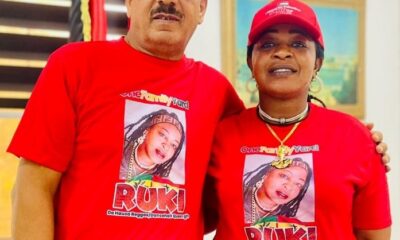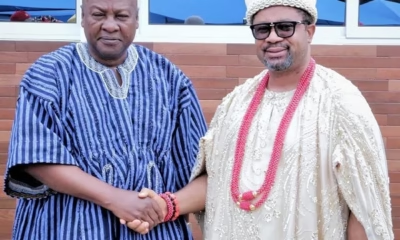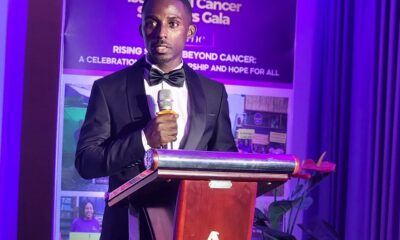Features
A quest to prolong our health-span
Published
4 days agoon

I have over the past two decades looked beyond mainstream medicine to assess other options that lead to holistic health, and I must say it’s been exciting and revealing but it’s not an easy path.
As I matured and my knowledge expanded, I have changed my opinion on some aspects of wellness and many findings have been humbling. We all continue to learn each day.
I will share some of the life-changing skills that we take for granted. In our quest for wellness there appears to be more questions than answers, but moderation still remains key in our daily lives. The power of prayer, praise and worship of God can not be taken out of the equation.
Ready. Set. Let us do this together.
1. Strength Training is a must for ALL of us
a. Yes, we all need to dig into the various aspects of exercise; strength training, cardiovascular training, stretches or flexibility training and balance training. If you asked me about a decade ago to pick the king of all exercises, I would naively have answered cardiovascular such as walking, cycling etc. but I am certain now that strength training trumps all and we need to incorporate at least a bit of that in our exercise programme.
2. Take a short walk after each meal
a. Many of us (your truly included) after dinner barely get to wash our hands before the miracle of the Lotus Eaters sends us to dreamland. Our fingers will be signaling to rats and cockroaches to come out and party.
b. Walking a few minutes after eating may hold the key to helping control our blood sugar levels and reduce the spikes in insulin that come with a myriad of issues. At the very least the short walks after eating will add up to increase the energy you expend daily.
3. Eating your vegetables and proteins before your carbohydrates may be helpful
a. Well, how true may this be? I suggest it is worth trying. I am not saying clear your plate of all protein before you even take a spoonful of carbohydrate. The fibre will slow the absorption of the sugar for hours and even better, you may feel full after the vegetables and protein and not be able to gobble down the mounds of carbohydrates you had planned to dismantle.
4. Eat slowly but do not get your boss angry
a. Eating slowly does not mean spending hours at lunch and courting the displeasure of your superiors. It takes about 20 minutes for your brain to realise you are full so dear friend, take your time to chew and enjoy your food. A meal “downed” in less than 20 minutes may cause you to virtually suffocate when you top up with water. This is a message to myself and all those who like me eat so quickly that Usain Bolt will envy our speed.
5. Eat from small, colourful plates
a. Small colourful plates make an impression on our brains. Since the little food appears loaded on a small plate our brains tend to “believe” it’s a lot of food and we feel full for a strange reason. Put the same amount in a large plate and you are likely to be asking for second servings.
6. By all means make friends
a. The power of social wellness and its role in longevity and an enviable health span is no longer in doubt. By all means make a few good friends and enjoy life! Thank me later.
7. Sleep!
a. Yes, I do agree there are at least seven forms of rest, and they are all equally important BUT start off with sleep and we will gradually rope in all others.
8. Keep your eyes on your numbers
a. I have written and spoken about the miracle of knowing our numbers and keeping them in check; blood pressure, blood sugar, lipids and BMI. Today I suggest you look at your heart rate closely. A low heart rate may be an indicator for staying here on planet earth for a long time. Also keeping glycate haemoglobin (long term blood sugar) low is another feather in the cap of longevity.
We are not waiting for a magical or ideal day to start working on our Health and Wellness, we start today bearing in mind that “the most efficient way to reach our realistic health and wellness goals is to make small healthy choices daily.
AS ALWAYS LAUGH OFTEN, ENSURE HYGIENE, WALK AND PRAY EVERYDAY AND REMEMBER IT’S A PRICELESS GIFT TO KNOW YOUR NUMBERS (blood sugar, blood pressure, blood cholesterol, BMI)
Dr. Kojo Cobba Essel
Health Essentials Ltd/ Mobissel
(dressel@healthessentialsgh.com)
*Dr. Essel is a Medical Doctor with a keen interest in Lifestyle Medicine, He holds an MBA and is an ISSA Specialist in Exercise Therapy, Fitness Nutrition and Corrective Exercise. He is the author of the award-winning book, ‘Unravelling The Essentials of Health & Wealth.’
Thought for the week – “WHERE YOU LIVE SHOULD NOT DETERMINE IF YOU LIVE.”—WHO
Dr. Kojo Cobba Essel
You may like
Ghanaians are becoming more scientific, perhaps too scientific for their own good. Some say they are scientific Christians and want to subject the doctrine of Jesus Christ to scientific analysis and proof. Such Christians need to be delivered in good time, lest they get struck on the way to Damascus.
Did I hear someone say the other day that he was following scientific diet? The person had formulated his own complex dietary regimen and called it scientific. I call it disaster. But who can blame him? There is freedom of speech. And the person’s stomach also has the freedom of expression, whether the stomach is manual or automatic.
A man has been battling a court case for some time now. His case is simple. He impregnated his girlfriend and together they were expecting the baby. A bouncy baby was delivered after five months and he celebrated with booze and break-dancing.
As he was preparing for an outdooring, someone came to whisper into his left ear that his baby had already been outdoored and named by another man. He nearly developed stroke.
When he made discreet enquiries, he realised it was true. A thick-tall barrel-chested man had already outdoored his baby in pomp and pageantry, brass band and spin-music backed by a live band performance. A comedian was at the ceremony providing all the laughter needed to make for a grand occasion.
ARGUMENT
He furiously confronted the girlfriend and she told him curtly: “The baby is not yours!” He nearly collapsed. Since when did the baby not become his? He endured a brief argument and then decided to send the matter to court.
Meanwhile he had information that his baby’s new father was someone who had been infertile or precisely was infertile. It meant that he couldn’t impregnate a woman no matter the number of rounds he went per night. However, he was very successful and rich.
He was alleged to have been looking desperately for offspring. So when he had an affair with a lady and she came with the news that she was pregnant, he did not even enquire whether it was by him or not. He quickly accepted responsibility.
However, another school of thought has it that the man plotted with the lady to get pregnant by another man and let him (the infertile man) take responsibility. Unfortunately, the alleged true father of the baby won’t let go, so the matter went to court.
When a paternity case winds up in court, then scientificity comes to play, because the judge cannot use his legal knowledge, no matter how vast, to ascertain the true father of the baby.
In hospital, the simple method of using the ABO blood group test has been often employed. If the father has Blood Group A and the mother has Blood Group B, it is automatic that the offspring must have Blood Group AB and not O. However, the child could have AB and still not belong to the man because the other man might also have Group A.
So the most reliable method is what has made Ghanaians more scientific in their outlook lately. Everybody is talking about DNA. Even my grandmother in the village knows about it, and she can tell you exactly what it is.
DNA in full is ‘Deoxyibonucleiacid’. It represents the genetic code of the human person. In other words your DNA determines how you look like. And there is a link between your DNA and that of all your offspring are identical in a way. It is 99 per cent accurate in determining paternity.
JOY FM recently did an interesting programme on paternity. A man who won a US Visa lottery and wanted all his four kids to accompany him on the trip was required by the embassy to do a DNA on the kids. Lo and behold, two of them were certified as NOT his children. CHECK out the embarrassment!
ATOMIC
If this is true, then it means that other grand exposures are in the pipeline. Happy families are going to be shattered with the force of an atomic bomb. What is man going to do with a child he has loved and cared for, educated and has become emotionally attached to only to hear that he was spending all his fortune on another person’s child.
The human female is not supposed to have the attitude of a nanny goat who doesn’t know or care to know the father of her children. After all, no outdooring or naming ceremony will take place. And there will be no US VISA requirement, if a nanny goat “jams an international luck.” By accident or by fate.
Well, I guess and more people will be getting curious about their offspring, especially when your kid looks exactly like a man living a hundred metres away.
I am aware of a man who has three children and two are not his. The man is however content. I’m sure the wife would be in for some hefty cutlass wounds. So in circumstances like this, it is better to let sleeping dogs lie. Revelations can bring tragedy. They can bring death.
Now the question every family man should be asking himself is: How many of my children are mine? If you have cause to believe that all your kids are not yours, you can drag your wife for a DNA together with the kids trailing behind you. But remember you might end up with a hefty slap from your wife if the DNAs prove that the kids are all yours, after all.
Whatever it is, women should be coming to terms with the fact that people are indeed becoming more scientific. So gone are the days that you get pregnant by another man and give the child to another. Chances are that you might be found out and disgraced.
The human female must stop being a problem unto herself.
This article was first published on September 3, 2005
Social comparison: The unrealistic standard
SOCIAL media platforms promote social comparison, with users often comparing their lives to the curated and manipulated content of others. This can lead to decreased self-esteem, decreased motivation, and decreased overall well-being. According to a study by the American Psychological Association, social comparison on social media is associated with decreased self-esteem and decreased life satisfaction.
Online radicalisation: The spread of extremist ideologies
Social media platforms have become breeding grounds for extremist ideologies, with many users being radicalised online.
According to a study by the Counter Extremism Project, social media platforms have been used to spread extremist ideologies, recruit new members, and plan violent attacks.
Decreased attention span: The consequences of brevity
Social media platforms promote brevity, with users often scrolling through their feeds in a matter of seconds.
This can lead to decreased attention span, decreased cognitive performance, and decreased ability to engage in meaningful conversations.
According to a study by the University of California, Irvine, social media use is associated with decreased attention span and decreased cognitive performance.
Impact on relationships: The decline of face-to-face interaction
Social media can also have a negative impact on relationships, with many users spending more time interacting online than in person.
According to a study by the Pew Research Center, 45 per cent of Americans believe that social media has decreased the quality of their relationships.
Solutions: Finding a way forward
While social media poses significant problems, there are solutions. By acknowledging these issues and implementing solutions, we can promote a healthier online environment.
1. Media literacy: Educate users to critically evaluate online information.
2. Regulation: Implement regulations to address online harassment and misinformation.
3. Digital literacy: Teach responsible social media use.
4. Mental health resources: Provide online resources for mental health support.
5. Social media guidelines: Establish guidelines for responsible social media use.
Conclusion
Social media poses significant problems, but by acknowledging these issues and implementing solutions, we can promote a healthier online environment.
It is essential to recognise the dark side of social media and take steps to mitigate its negative effects.
By working together, we can create a safer, more compassionate, and more responsible online community.
References
1. Pew Research Center (2020): “Mobile Technology and Home Broadband 2020.”
2. Royal society for public health (2017): “#StatusOfMind: Social media and young people’s mental health and wellbeing.”
3. World Health Organization (2018): “Mental health in the digital age.”
4. Knight Foundation (2020): “The Future of News: A Report on the State of Journalism in the Digital Age.”
5. National Center for Victims of Crime (2020): “Online Harassment: A Guide for Victims and Families.”
6. Pew Research Center (2020): “Americans’ Views on Social Media and Privacy.”
7. American Psychological Association (2020): “Social Comparison and Social Media.”
8. Counter Extremism Project (2020): “The Role of Social Media isation.”
9. University of California, Irvine (2020): “The Impact of Social Media on Attention Span and Cognitive Performance.”
10. Pew Research Center (2020): “The Impact of Social Media on Relationships.”
By Robert Ekow Grimmond-Thompson
Fire disasters are gradually becoming an almost normal event in this country. The aftermath of these fire disasters, bring economic hardships to people whose properties have been ravaged, emotional traumas and negative life changing experiences.
There are two main types of fire disasters, those that affect individual homes and those which affect a large group of people like market fires, school dormitories etc. The picture of a man who was weeping uncontrollably after his wife and three children got burnt in a fire disaster which struck his house, will never leave my memory.
The trauma that this individual will experience is so severe that it has the potential to permanently affect his mental health. It is something that any person with an iota of humanity will not wish upon his or her worst enemy.
The Ghana National Fire Service (GNFS) have reported that there were 6436 fire incidents in 2024 which was about 7.7 per cent more than what was recorded in 2023. If this was a GDP percentage growth figure, it would have been good news but this is incidents of fire and therefore very bad news. This year alone, there has been at least two major fire disasters, one at Kantamanto and the recent one at Adum Blue Light area.
TV reports showing wailing women, traders whose livelihood had been destroyed by the devastating fire, was heart wrenching. The question then is, what are the steps or measures being put in place to prevent this incidents from recurring? Given the quality and calibre of personnel in the GNFS, it beats my imagination why such market fires cannot be prevented or if they occur, are not readily dealt with to prevent them getting out of control.
The GNFS conducts investigation into every fire disaster in this country. It can therefore be safely concluded that, they have identified the major causes of these fire outbreaks and there must be measures, to prevent their recurrence. It is therefore unacceptable to see that a fire breaks out and it cannot be contained fast enough, to prevent it from spreading out of control.
The problem in this country is that, we are quick to set up committees to investigate issues but little or nothing is done regarding implementation of the findings or recommendations. A certain attitudinal change is required to ensure a permanent solution for these fire disasters.
If markets are created without proper accesses such that, fire tenders will have easy access to all parts of the markets, not much can be done in the event of a fire outbreak. One of the major issues which according to the PRO of the GNFS, prevented them from quickly attacking the fire, was a lack of access into the market.
One important thing we have to pay attention to is a complaint from the fire men regarding access to hydrant points. The GNFS has reported on several occasions, a lack of access to hydrant points as a result of deliberate building of structures over them. These issues have to be addressed so that fire disasters could be prevented. The fire equipment required by the GNFS must be paid attention to.
The infrastructure that existed some 20 years ago are different from what exists now. Fire tenders with ladders which were adequate for firefighting, are now not fit for purpose because we now have very tall structures in cities like Accra.
The GNFS must be fully and appropriately resourced. Let the powers that be, prioritise fire prevention in this country to prevent painful experiences. God bless.
NB: ‘CHANGE KOTOKA INTERNATIONAL AIRPORT TO KOFI BAAKO INTERNATIONAL AIRPORT’
By Laud-Kissi-Mensah

Suspicious flights: I was part of the screening team; no drugs were found – Deputy NACOC boss

Ghanaian Guinness World Record holder presents certificate to GTA

Minister participates in national dialogue on affirmative action and female leadership
Trending

 Politics7 months ago
Politics7 months agoVoter Register Discrepancies: NDC to stage nationwide protests against EC

 News8 months ago
News8 months agoArise Royals Montessori School Marks 2nd Graduation.

 Entertainment9 months ago
Entertainment9 months agoGhanaian musician Champions Gaza Peace with New Track

 News4 months ago
News4 months agoKing of Igbo Community in Ghana congratulates Mahama as President-elect of Ghana.

 More8 months ago
More8 months agoYoung people urged to develop their talents

 Entertainment9 months ago
Entertainment9 months agoSteps to receive an official GWR certificate – Details from mother of a Ghanaian record holder

 News9 months ago
News9 months agoCancer Support Network Foundation holds gala

 News9 months ago
News9 months agoDedicate a Portion of GDP for investment in AI to improve health and reduce poverty – Prof. Samuel Kojo Kwofie

















